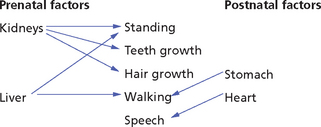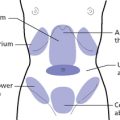 CHILDREN’S SYMPTOMS
CHILDREN’S SYMPTOMS
MOTHER’S PREGNANCY
When a baby cries a lot at night and vomits frequently, this may be due to what the Chinese called ‘womb Heat’, which itself may be due either to the pregnant mother’s consumption of excessively hot foods or, more commonly, to her suffering from shock during pregnancy. Prenatal shock may also manifest with a bluish tinge on the baby’s forehead and chin.
The influence of pregnancy events on the baby’s health is discussed also in Chapter 48.
IMMUNIZATIONS
A full discussion on immunizations is beyond the scope of this book. To understand the effect of immunizations from a Chinese perspective it is necessary to refer to the theory of the Four Levels (see Part 6). When a pathogenic factor invades the body, it enters the Defensive-Qi level first and, if not expelled, progresses through the Qi, Nutritive-Qi and Blood levels. The Four Levels represent four different energetic layers of penetration of Heat, the Defensive-Qi level being the most superficial and the Blood level the deepest.
The effect of immunizations from the Chinese perspective is discussed also in Chapter 48.
RESPIRATORY SYMPTOMS AND EARACHE
Symptoms and Signs, Chapter 90
Questions concerning cough, wheezing, breathlessness or earache are always important in the child’s interrogation because children are very prone to invasions of Wind, which may cause the above symptoms.
SLOW DEVELOPMENT
Slow development is caused primarily by congenital weakness of the Liver and Kidneys with the Kidneys affecting standing, teeth growth and hair growth and the Liver affecting standing and walking. Among postnatal causes, the Stomach influences walking and the Heart speech. Figure 47.1 illustrates the influence of prenatal and postnatal deficiencies on the Five Retardations.



